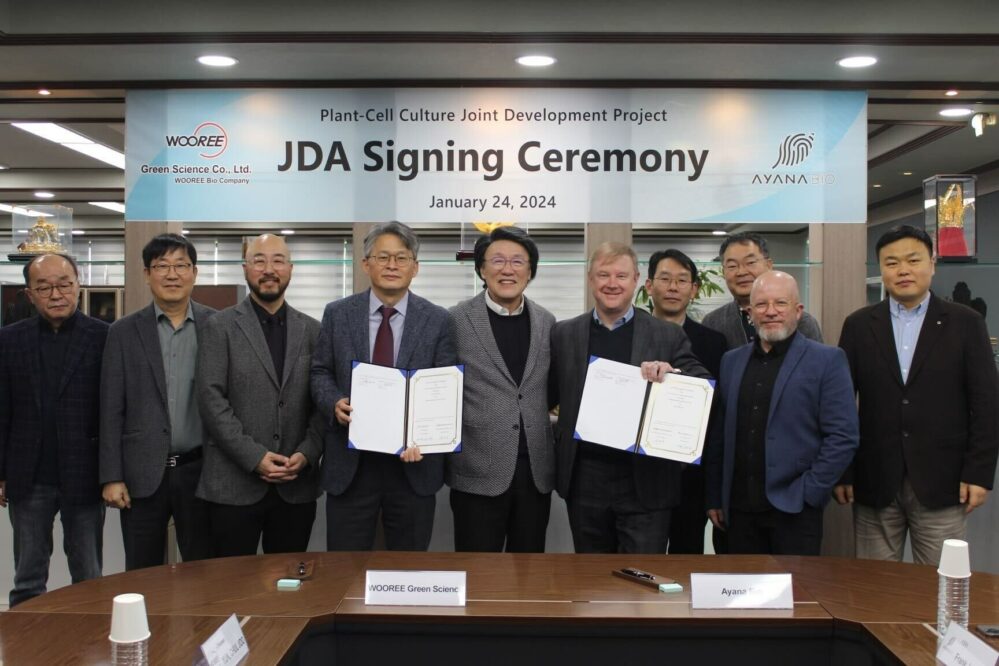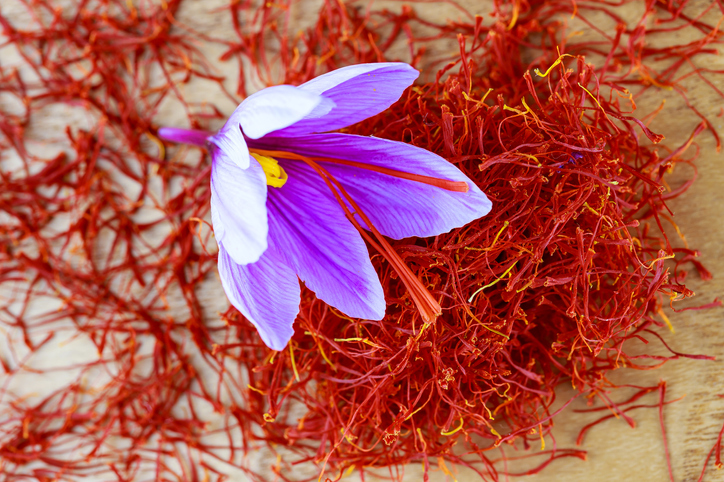Boston-based startup Ayana Bio has signed a “seven-figure” joint development agreement with biotech firm Wooree Green Science, a subsidiary of Korean conglomerate Wooree Bio, to develop saffron and other bioactives made via plant cell culture.
A spinoff from synthetic biology specialist Ginkgo Bioworks formed in 2021 with $30 million in funding, Ayana Bio is one of a new wave of startups making high-value ingredients from plant cell lines in bioreactors, an approach advocates claim can provide a consistent supply of botanicals from aloe vera and vanilla to cocoa polyphenols, echinacea and lemon balm without the supply chain headaches associated with traditional agriculture.
The partnership with Wooree will increase the accessibility and affordability of underdeveloped botanicals such as saffron, which is best-known as a luxury spice, but has also been linked to health benefits around mood, sleep, metabolic health and appetitive suppression that have not been fully explored owing to the prohibitively expensive nature of the ingredient, said Ayana Bio CEO Frank Jaksch.
“Saffron, like many other botanicals, faces a complex and uncertain future as it grapples with shifting weather patterns, pollution and water shortages in the limited number of countries where traditional production happens. We want to reinvigorate the natural plant-based weight loss supplement market so more people can reap the health benefits.” [Editor’s note: Click here to read our recent article on the ‘Nature’s Ozempic’ craze…]
“We’re excited to collaborate with Ayana Bio to utilize its plant cell cultivation technology for the production of new plant cell ingredients for a multitude of applications across food and beverages, cosmetics and pharmaceuticals. We look forward to commercializing these high-value sustainable ingredients through this partnership.” Um Tae Wook, CEO, Wooree Green Science
Data on appetite suppression and other health benefits of saffron is ‘preliminary’ but ‘exciting’
Ayana Bio VP of innovation Dr. Weslee Glenn noted that human clinical data on saffron’s ability to suppress appetite (click here, here, here and here for some studies) is preliminary, in part because it’s so expensive and difficult to cultivate.
He added: “Saffron extracts have been used in traditional medicine dating back millennia. And on the allopathic side, or what some may refer to as ‘Western medicine,’ the preclinical and clinical studies on saffron are exciting. But many of these studies are in the preliminary stages or are limited in scope due to the challenge of getting consistent biomass.”
So is it understood which components within saffron may confer specific benefits? And can Ayana Bio be sure that it is cultivating the important ones via a cell culture approach (whereby you feed plant cells sugars and other nutrients in cell culture rather than growing whole plants outdoors or in greenhouses)?
According to Glenn: “There are some preliminary studies that have linked specific components from saffron to specific health benefits, but most of those studies are pretty early. Again, if you don’t have a lot of the biomass, it’s hard to get the compounds and therefore it’s hard to study the health benefits.
“So I think that plant cell cultivation will allow us to suss out some of those benefits for Crocus sativus and other plants with expensive and limited biomass. I think one of the other benefits [of plant cell culture vs say precision fermentation to produce individual molecules] is that not only can you look at single molecules, but you can look at complete phyto-complexes that may deliver an entourage effect.”
He added: “We’re at the development stages right now, so we’re thinking clearly about how we want to elicit production of various pathways in the plant and also how we might think about improving production of specific compounds. Wooree Green Science brings a wealth of manufacturing expertise and infrastructure, which will also aid in scale-up and bioprocessing.”
Plant cell culture in action
So how does it work in practice?
First, Ayana Bio takes tissue samples from multiple parts of the plant, sterilizes them, and applies plant hormones to effectively ‘de-differentiate’ or return the cells to a stem-cell-like state so that they can proliferate in culture. Then it “puts them into liquid suspension and elicits the production of specific compounds or pathways,” says Glenn.
“You try and start the cell culture with the native tissues that make the components of interest, but there are myriad examples out there where you can generate a plant cell culture from an organ that doesn’t make your molecule of interest, and you can coax the plant cell culture into making that, because the cells have all of the genes that you need to make molecules of interest, so you really just have to figure out how to turn them on. We do that with elicitors.”
While Ayana can genetically engineer its cell lines, its first wave of products are non-GMO, said Glenn, who noted that by knowing the underlying genetics and metabolomics behind a trait improvement, the company can selectively target specific genetics for trait improvement, without creating GMOs.

The case for plant cell culture
But why use plant cell culture in the first place?
According to CEO Frank Jaksch, the sweet spot for the technology, which is best-known for the production of breast cancer drug drug Taxol, is where it’s too expensive or impractical to extract bioactives from fully-grown plants, and they cannot be expressed by microbes using precision fermentation.
“Plant cells produce the full set of bioactives that are contained within that plant, not just a single, cherrypicked chemical,” he told us in a recent interview. “If you believe in getting the synergistic effects of multiple bioactives contained within a plant, you’ll never get that with precision fermentation.”
As for the botanical supply chain, he explained, sourcing a consistent supply of high-quality botanicals can be extremely challenging, as bad weather, political instability, adulteration, pesticides, heavy metals and disease can threaten supplies and create YoYo pricing.
“Bringing plant cell-derived health and wellness ingredients to these markets will help CPGs (consumer packaged goods companies) access the full spectrum of bioactives characteristic of these plants, without the supply chain challenges.”
As for scalability, he said, “We’ve got some early data that suggests we’re going to be able to compete with traditional agriculture for several botanical ingredients, particularly those experiencing [supply chain] problems. With agriculture, it’s so unpredictable, you can buy from one farm one year and get a great crop, and the next year the crop from the same farm is no good.”
Ayana Bio believes it has a “pathway to scale plant cell culture on a very large scale,” added Jaksch, but stressed that the firm is “starting small” with contract manufacturing partners to focus on high-value botanicals for which there is already an established market in dietary supplements.
Ayana Bio’s Plant Cell Advantage ingredient portfolio includes dog rose, hedge nettle, sage, echinacea, and lemon balm.
- Read more HERE about ReaGenics, another company that has been exploring the production of saffron via plant cell culture.
Further reading:





